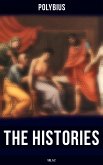Tacitus's 'Histories' is a detailed account of the reigns of the Roman emperors from 69-96 AD, focusing primarily on the tumultuous Year of the Four Emperors in 69 AD and the subsequent Flavian Dynasty. Written in a detached and objective style, Tacitus uses a combination of historical facts and vivid storytelling to provide a well-rounded view of the political intrigues, military campaigns, and social upheavals of the time. His use of rhetorical flourishes and powerful imagery adds depth and complexity to the narrative, making 'Histories' a compelling read for those interested in the history of ancient Rome. Tacitus's meticulous attention to detail and critical analysis of the events make this work an important contribution to Roman historiography. Historical scholars have praised Tacitus for his unbiased portrayal of the characters and events, making 'Histories' a valuable source for understanding the complexities of Roman history. I highly recommend 'Histories' to anyone looking to delve into the political machinations and social dynamics of ancient Rome, as Tacitus's insightful analysis and engaging narrative style make it a must-read for history enthusiasts.
Dieser Download kann aus rechtlichen Gründen nur mit Rechnungsadresse in A, B, BG, CY, CZ, D, DK, EW, E, FIN, F, GR, H, IRL, I, LT, L, LR, M, NL, PL, P, R, S, SLO, SK ausgeliefert werden.









